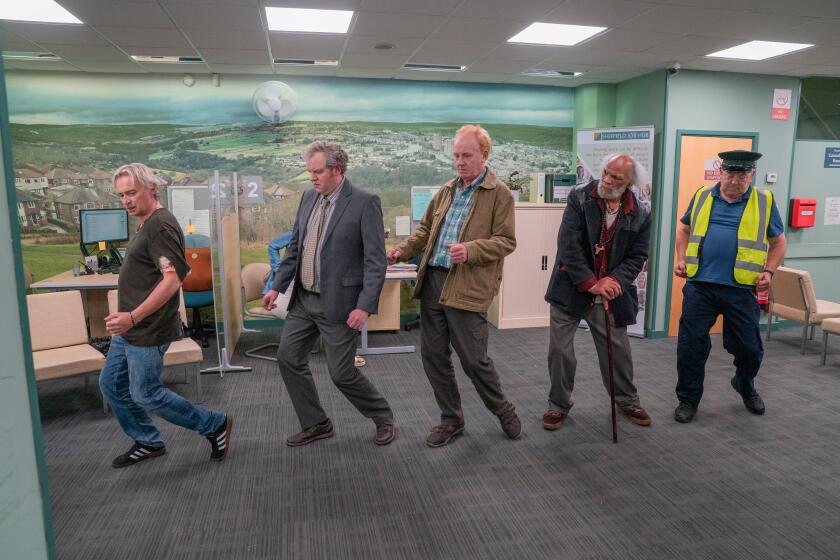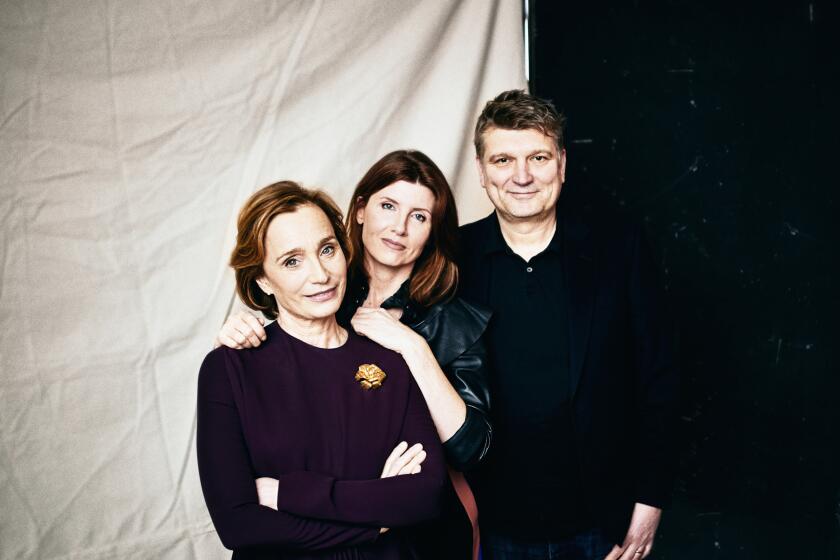‘The Full Monty’ returns and the working-class struggle remains
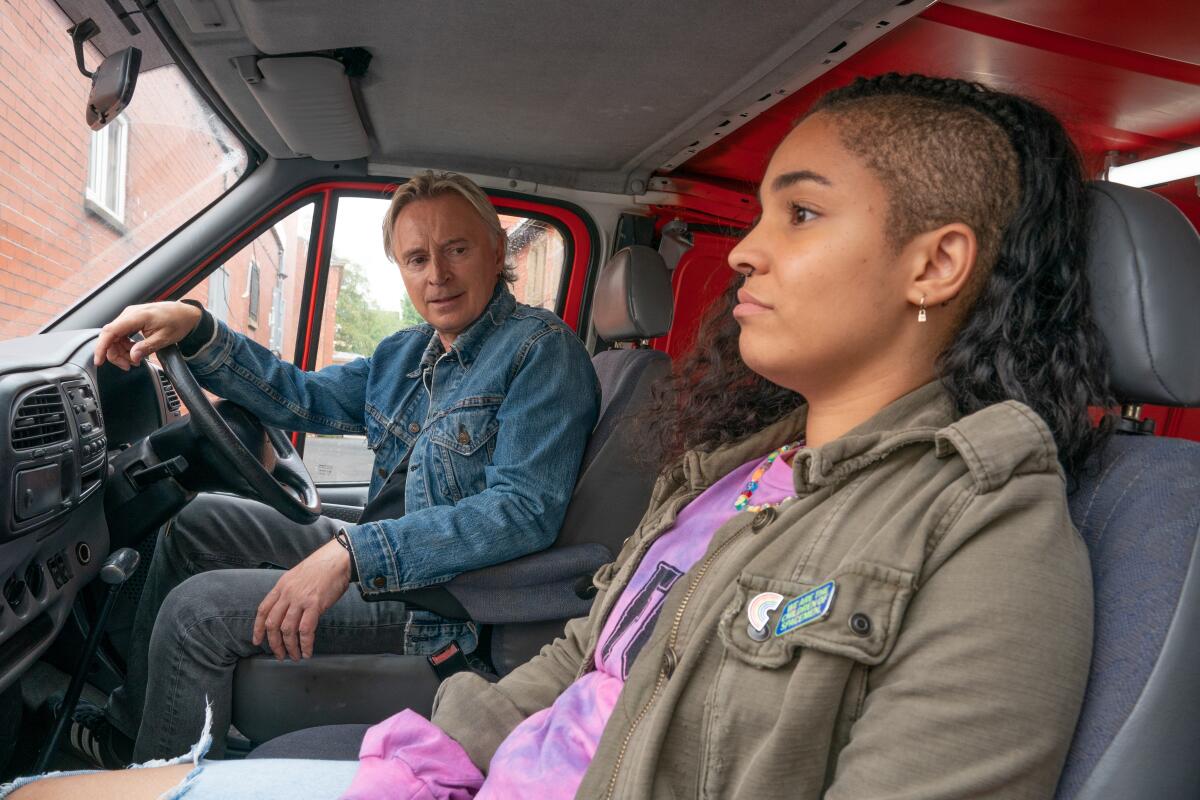
- Share via
LONDON — Since its release in 1997, there have been many rumblings about a sequel to “The Full Monty.” The film, written by Simon Beaufoy and directed by Peter Cattaneo, left its characters on an optimistic note, but both fans and the cast have often wondered what happened next.
More than 25 years later, Beaufoy found a way to tell a follow-up story, with an eight-episode series on FX and streaming on Hulu, also titled “The Full Monty.”
“Simon had been approached many times over the years, especially in the first few years after the film, to do a second film,” says Robert Carlyle, who reprises his role as Gary “Gaz” Schofield. “But it was something he wasn’t interested in, and it was maybe something I wouldn’t have been interested in either. The film itself was such a complete piece. But when Simon got in touch a couple of years ago and said, ‘Do you fancy revisiting these characters 25 years later?’ I thought it sounded like a good idea.”
The popular 1997 British comedy film is back as a TV series on FX that gives some characters breadth and depth and brings in a younger generation.
Beaufoy, who wasn’t available for an interview due to the ongoing writers’ strike, decided to return to the story because he saw the characters and their lives in Sheffield, England, as a way to discuss issues in contemporary Britain.
“There’s been a lack of leveling up. There’s been Brexit, there’s been austerity. People have struggled and suffered,” says Lesley Sharp, who plays Jean. “I think [Simon] got to a point a couple of years ago where he felt it was timely to revisit those characters and see exactly how their lives might have changed, or not.”
The film, about a group of men who form a striptease group after the steel factory where they work closes down, focused on unemployment in the north of England in the 1990s. The series reunites Carlyle and Sharp with other members of the film cast, including Mark Addy (Dave), Tom Wilkinson (Gerald), Steve Huison (Lomper) and Paul Barber (Horse). (Hugo Speer, the actor who plays Guy, appears as well, but he was dropped from the series after allegations of inappropriate conduct surfaced during filming.)
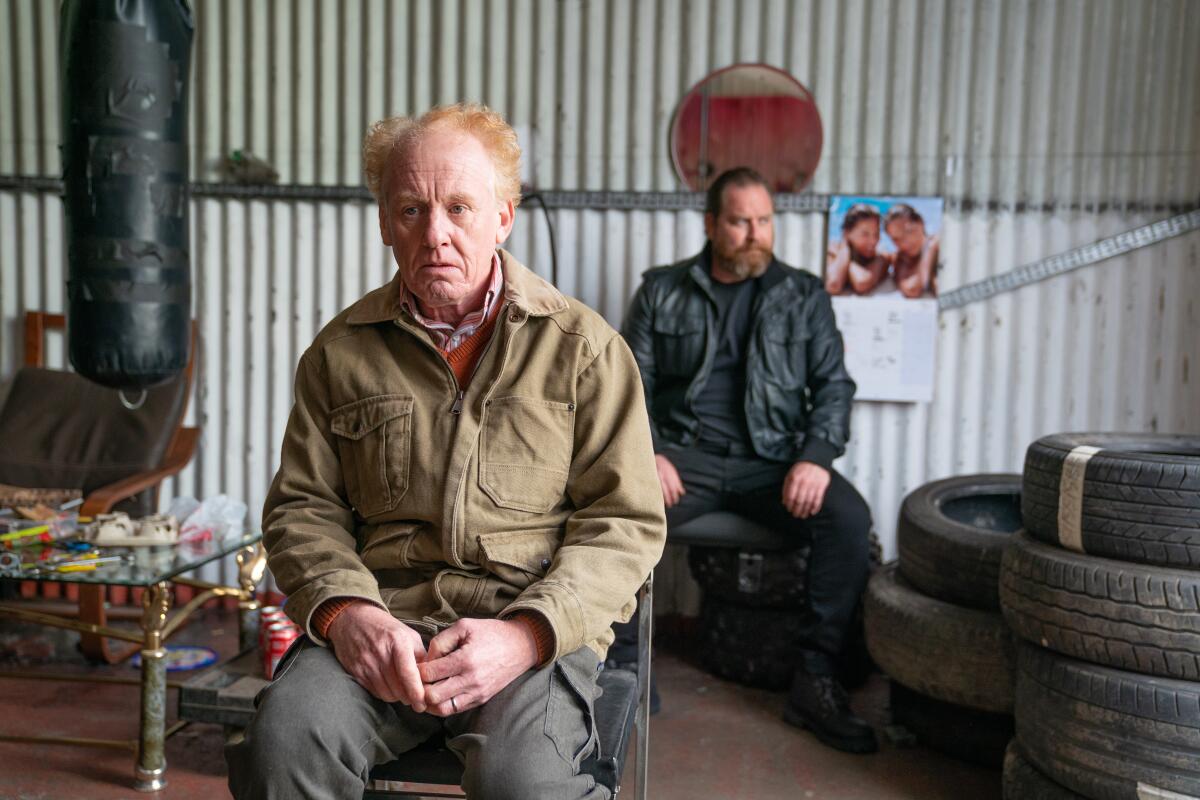
This time around, the series reflects on the high cost of living; the decline of the National Health Service, Britain’s universal healthcare system; the lack of government support for people in need; and the failing education system. They are familiar themes not just in Britain but in America as well, where the cost of living has soared and many major cities, including Los Angeles, are dealing with a housing affordability crisis.
“One of the reasons why the film was so successful, and hopefully the series will be too, is that the community which Simon is writing about is not just a community that exists in the north of England,” Sharp says. “Arguably, those communities exist across the globe, in every single country. There are people who are living in areas where they don’t have what other people have and they’re having to really struggle to make ends meet, but they are doing it with great heart and wisdom and warmth.”
Peter Cattaneo earned an Oscar nomination for “The Full Monty” and then couldn’t figure out what to do next. He’s back 23 years later with the British choir comedy “Military Wives.”
Beaufoy teamed up with Alice Nutter, whom he previously collaborated with on the FX series “Trust,” to write the scripts. The familiar characters remain, and continue to struggle and scheme, and the series introduces several new ones, including Gaz’s daughter, Destiny (Talitha Wing), and Lomper’s husband, Dennis (Paul Clayton).
Huison, who left acting years ago to become a painter, says he agreed to play Lomper again because he trusts Beaufoy’s storytelling. It helped that his castmates were in as well.
“They said, ‘Everybody else is on board,’ which is obviously a lever,” says Huison.
The series shifts its focus away from the characters’ short-lived stripping career, which came as a relief for the cast, who felt they were too old to be taking their clothes off onscreen.
“One of the first emails that Simon wrote to me said, ‘Don’t worry, there’s no stripping,’” Carlyle says. “But [the film] was never about stripping. It was a political piece. Politics were the reason these guys were stripping in the first place. There was the death of the steel industry, and in the ’80s and ’90s there were all these unemployed men. Not just in Sheffield, but all over the country. They lost their place in society.”
A TV series also allowed Beaufoy and Nutter to explore Jean, Dave’s wife, more fully. She’s the headmistress of a school that is literally collapsing, and her marriage to Dave is in peril because the couple has buried their grief after losing a child.
“The relationship between Jean and Dave arguably was the emotional center of the film,” Sharp says. “Jean was Dave’s biggest cheerleader, and now that has been reversed in a way. Jean has gone all the way with Dave’s support and help. But you’ve got two people who are dealing with a very difficult situation, the death of their baby, and they have both dealt with it in very different ways. Now they’re in danger of losing everything that was so precious.”
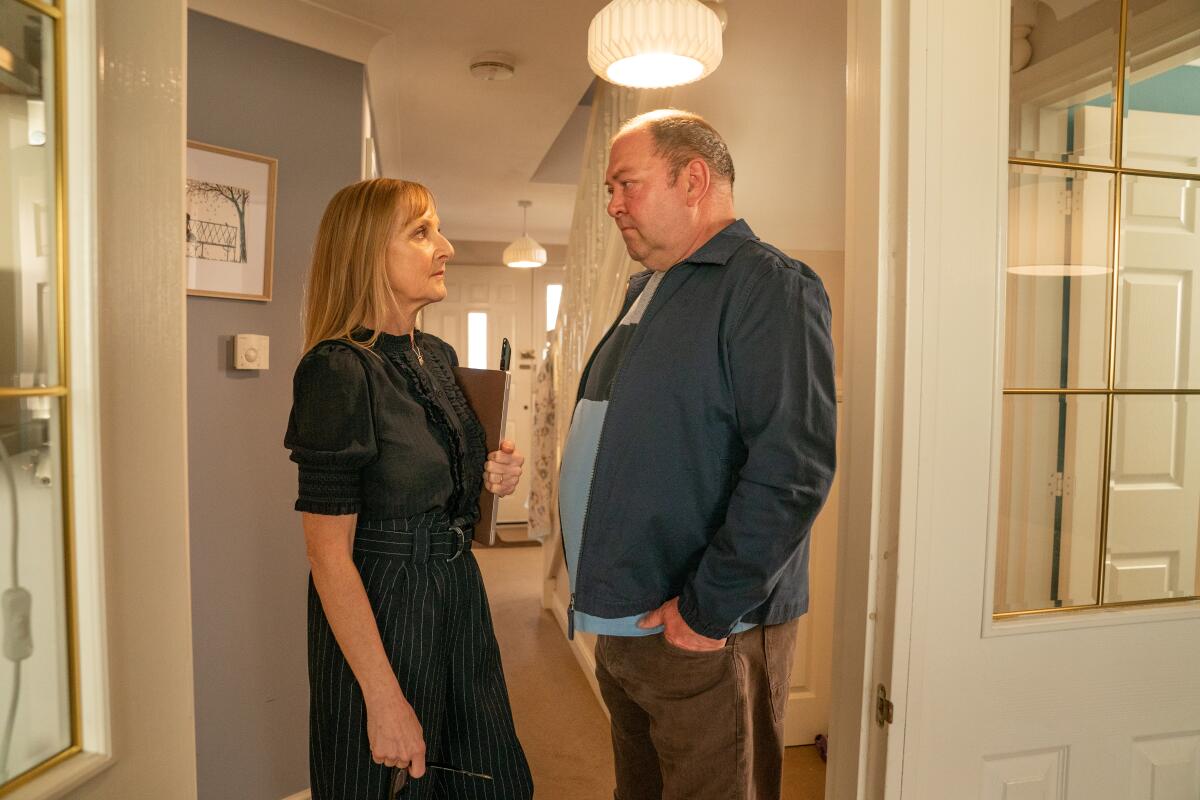
While Sharp and Addy have been in contact in the years since the film’s release, many of the other cast members hadn’t seen each other since the ’90s.
“It’s a strange thing for people because you imagine we’re all friends forever and we’re constantly in touch, and you are — when you film something, it’s like a wee family,” Carlyle says. “But as soon as it finishes, you’re off doing something else. So it was an amazing moment at the read-through. And then when we got on to the filming, that was fantastic because you realize, ‘Oh, my God, there’s a shorthand here.’ You don’t just know your own character, you know these other characters as well.”
“It was just like putting on an old pair of slippers,” Huison adds. “And I was just like, ‘Off we go again!’”
The TV series balances humor and tragedy like the film did; however, it’s clear in the episodes that things are more dire now. Sharp remembers a sense of hope in 1997: A Labour government had been elected, and regeneration was in the works for areas that had taken a hit during the ’80s.
“For a while, it looked like that was happening,” Sharp says. “But the whole world has had to recalibrate after financial market crashes and then the pandemic and so on. Unfortunately, there have been places left behind that didn’t need to be.”
Sharp sees the series as part of the British tradition of not shying away from important issues onscreen. The episodes are entertaining, but the political undercurrent is undeniable, which attracted Huison.
“Simon said, in the first phone call I had with him over this, that he was just so hacked off with this government and what they’re doing to people,” Huison says. “And he needed to say something about it, and the only way he knows how is to write drama. So he wanted to write something that wasn’t about your aspirational, middle-class families all having a bloody nice time. He wanted to write about normal people.”
He adds, “You’re showing people a different side and hopefully getting people to talk to each other about it. Keep the conversation going, rather than shutting it down and pretending it’s not happening.”
While “The Full Monty” brings most of its storylines to a resolution, there appears to be space for the series to continue. Some cast members say they would come back for another season if the circumstances were right.
“I think there’s more life in it,” Carlyle says. “It speaks to society today. I love these characters, and I love that world. I come from that world. I love it when you get the chance to give people who don’t have a voice a voice, and that’s what ‘The Full Monty’ does for the working class.”
More to Read
The complete guide to home viewing
Get Screen Gab for everything about the TV shows and streaming movies everyone’s talking about.
You may occasionally receive promotional content from the Los Angeles Times.
